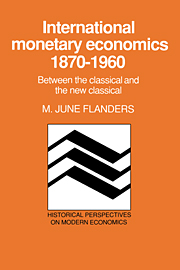Book contents
- Frontmatter
- Contents
- Preface
- 1 Preliminaries
- 2 Stream P
- 3 The beginnings of the neoclassical tradition
- 4 The locus classicus of the neoclassical position
- 5 The Macmillan Committee
- 6 A second diversion: Keynes and the Macmillan Committee
- 7 The anti-neoclassicals
- 8 Indian currency and finance: a tract on monetary reform
- 9 A treatise on money
- 10 Late Keynes: towards Bretton Woods
- 11 The crisis writers
- 3 Stream F
- 4 The confluence
- Ex post
- Bibliography
- Index
11 - The crisis writers
Published online by Cambridge University Press: 12 October 2009
- Frontmatter
- Contents
- Preface
- 1 Preliminaries
- 2 Stream P
- 3 The beginnings of the neoclassical tradition
- 4 The locus classicus of the neoclassical position
- 5 The Macmillan Committee
- 6 A second diversion: Keynes and the Macmillan Committee
- 7 The anti-neoclassicals
- 8 Indian currency and finance: a tract on monetary reform
- 9 A treatise on money
- 10 Late Keynes: towards Bretton Woods
- 11 The crisis writers
- 3 Stream F
- 4 The confluence
- Ex post
- Bibliography
- Index
Summary
The neoclassicals viewed short-term capital movements as a phenomenon that resulted from central bank policy and performed the role of financing imbalances. The anti-neoclassicals either denied that this was the way the world functioned or, more often, argued that it ought not to work that way. Hawtrey challenged the neoclassical concept of short-term capital movements as playing a benevolent role: adjusting and financing imbalances. Hayek argued that short-term financial capital movements should not be thought of or treated differently from any other kind of trade in assets (including goods), and should not be deliberately elicited by central bank policy (see Chapter 7). The late classicals used long-term capital movements as a starting point for analyzing the classical adjustment mechanism. That is, capital flows constituted the disturbance they chose in exploring empirically (“inductively”) the process of adjustment; short-term capital movements were often, in their work, important components of the adjustment, substituting for gold movements, and offering temporary financing.
The group of writers I am discussing now fixed their attention on capital movements, primarily short-term capital movements, with the aim of sorting out when they were endogenous and when exogenous, when financing, when destabilizing. They emphasized monetary and money market phenomena, and the possibly stabilizing or destabilizing effects of these, through internal, domestic monetary repercussions. I am thinking here of people such as Bloomfield (1950), Kindleberger (1937), Nurkse (1944). Predating most of these is the Italian, Marco Fanno (1935 and 1939).
- Type
- Chapter
- Information
- International Monetary Economics, 1870–1960Between the Classical and the New Classical, pp. 207 - 220Publisher: Cambridge University PressPrint publication year: 1990



